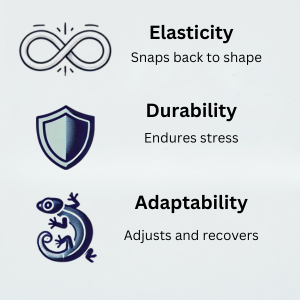Building Resilience: Strategies for Thriving in the Face of Challenges
Jul 07, 2024
Have You Ever Faced an Insurmountable Challenge?
A moment where you questioned your ability to push through? Resilience is the key to not only overcoming obstacles but also emerging stronger and more capable.
In this blog post, we dive deep into the concept of resilience, sharing personal stories and practical strategies to help you build this crucial skill. Imagine navigating life's toughest storms with confidence and grace, emerging each time not just unscathed but stronger.
What is Resilience?
Resilience is the capacity to adapt to and overcome challenges, whether they come from within or from external adversity. It’s a critical skill for both personal and professional growth.
The Properties of Resilience
Resilience has three core properties:
-
Elasticity – The ability to return to an original state after being stretched.
-
Durability – Withstanding repeated stress without permanent damage.
-
Adaptability – Adjusting to changes and recovering quickly.

Think of it like a rubber band: just as it can stretch and return to its original shape, resilient individuals can endure stress and pressure while maintaining their core strength.
A Personal Story: How a 10-Day Silent Vipassana Meditation Retreat Built My Resilience
Working in the oilfield taught me a lot about resilience. On my first day, when I asked for a chair, I was told to grab a bucket because I wasn’t worthy of a chair. That tough environment helped me develop thick skin, but my biggest lesson in resilience came from a 10-day silent Vipassana meditation retreat.
For 10 days, I remained silent, meditated for over 10 hours a day, and faced my thoughts without distraction. This required a level of mental and emotional endurance I hadn't encountered before. The experience taught me a powerful lesson in discomfort management, focus, and inner strength—skills that helped me thrive in high-stress work environments.
One of the core teachings of Vipassana is Anicca, or impermanence. Understanding that both pain and pleasure are temporary made it easier to endure tough moments and not cling to fleeting successes. This realization was instrumental in building my resilience.
Mindfulness as a Tool for Resilience
Mindfulness practices are essential for developing emotional regulation, a key component of resilience. Here are some practices that can help:
-
Meditation – Improves focus and emotional regulation.
-
Mindful Breathing – Helps manage immediate stress and calm the mind.
-
Yoga and Tai Chi – Promote physical and mental balance.
For example, a daily mindfulness practice can enhance your ability to stay calm under pressure, making it easier to recover from stressful situations.
The Power of Grit and Resilience
Beyond resilience, grit plays a crucial role in long-term success. Angela Duckworth, in her book Grit, emphasizes the importance of passion and perseverance over years despite failure, adversity, and setbacks.
If resilience is about bouncing back, grit is about having the stamina to keep pushing forward. Developing both is essential for achieving long-term success.
The Role of Rejection in Building Grit
Rejection can be a powerful catalyst for growth. Each rejection is an opportunity to:
-
Develop emotional regulation.
-
Improve self-awareness.
-
Strengthen perseverance.
As Duckworth says, "Grit is passion and perseverance for very long-term goals. Grit is having stamina." By embracing rejection, we build both resilience and grit, preparing ourselves for future challenges.
Beyond Resilience: The Concept of Anti-Fragility
While resilience helps you recover, anti-fragility takes it a step further. Nassim Nicholas Taleb, in Antifragile, describes systems that not only withstand shocks but actually grow stronger from them.
Stages of Growth:
-
Fragile – Easily broken by stress.
-
Resilient – Recovers from setbacks.
-
Robust – Endures stress without change.
-
Anti-Fragile – Becomes stronger from stress.
For example, Muay Thai fighters undergo shin conditioning, repeatedly striking heavy bags to create micro-fractures that heal and strengthen over time. Similarly, in life and business, tackling difficult projects and learning from setbacks make us more adaptable and mentally tough.

Strategies for Building Resilience: The 7 R's
Building resilience requires cultivating key habits and mindsets. Here are the 7 R’s of Resilience:
-
Reframe Your Mindset – Shift your perspective to see challenges as growth opportunities. Example: Keep a gratitude journal to focus on positives.
-
Regulate Your Emotions – Use deep breathing and mindfulness to manage stress effectively.
-
Reconnect with Others – Build a strong support system of mentors, peers, and loved ones.
-
Relearn Continuously – Stay mentally agile by acquiring new skills and knowledge.
-
Reflect on Your Purpose – Regularly revisit your core motivations to stay focused.
-
Recharge Regularly – Prioritize self-care, meditation, and setting boundaries.
-
Repeat Healthy Habits – Build consistency in resilience-building practices.
Final Thoughts
Building resilience is essential for navigating life’s challenges and achieving your goals. By incorporating these strategies into your routine, you can develop the ability to adapt, endure, and thrive in any situation.
Start small—pick one strategy and apply it consistently. Whether it’s daily mindfulness, strengthening your support network, or developing grit, every step contributes to a more resilient you.


